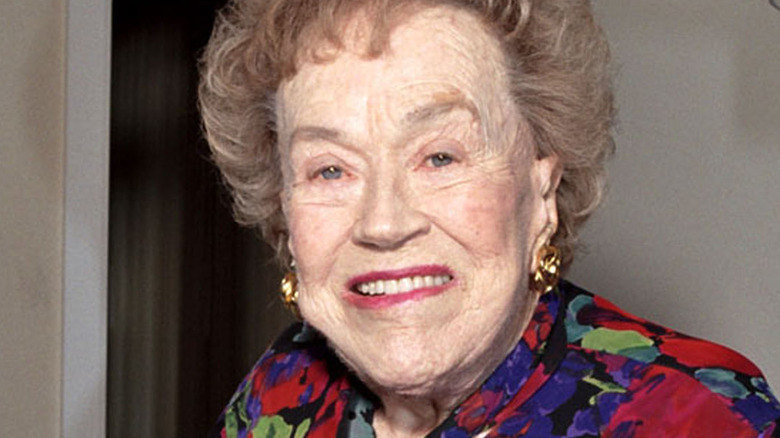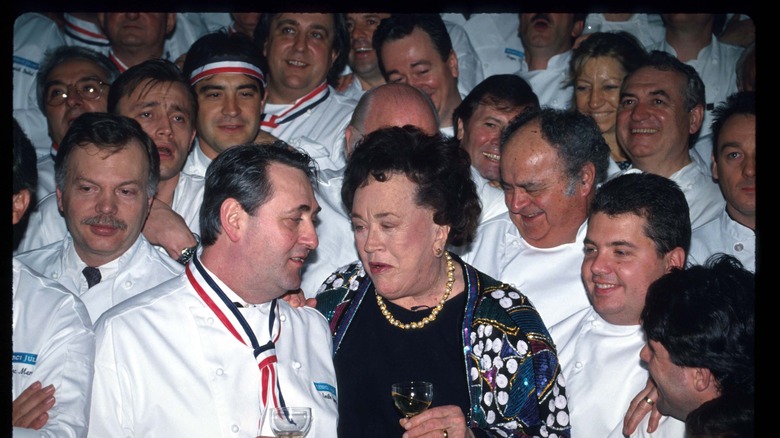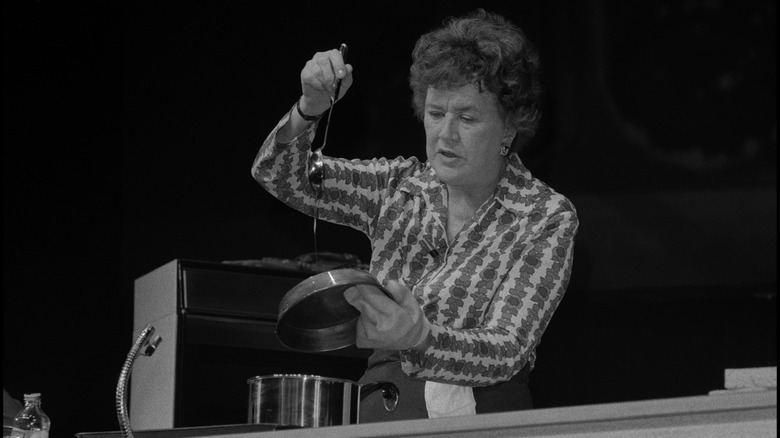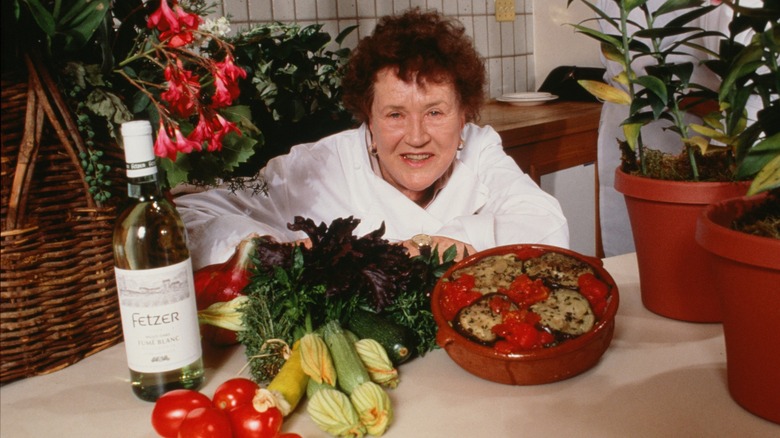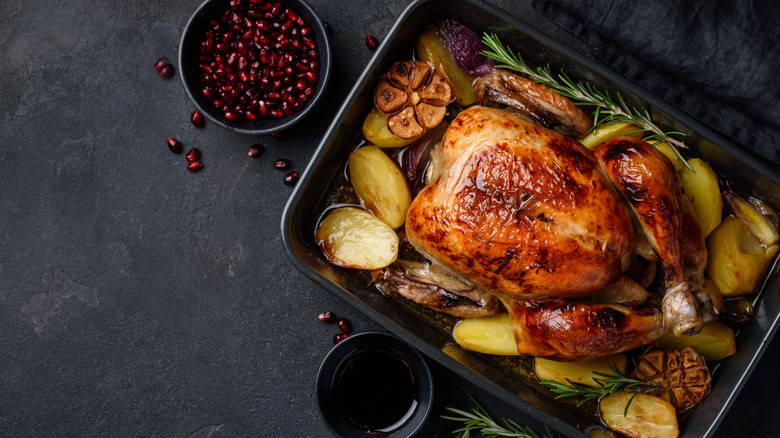Todd Schulkin Keeps Julia Child's Spirit Alive With Her Foundation - Exclusive Interview
Julia Child's groundbreaking career has earned her a beloved place in the hearts and kitchens of many Americans. While her fans likely know that she was once a spy and that she lived a beautiful life in France with her husband, Paul Child, the latest television series to follow her life and career mark a lesser viewed period of her life. On March 31st, HBO Max will premiere the new series, "Julia," which focuses on the later period of Child's life well after her first cookbook was published.
To learn more about the portrayal of Child in the series and the legacy of the beloved chef, Mashed spoke with The Julia Child Foundation's Executive Director Todd Schulkin. The foundation director spoke to what a joy the series was to see and how the foundation continues Child's legacy by further the professionalism of the culinary arts. Although the series is not a strict documentary, it does take a lovable view of everything Child was and stood for, in Schulkin's opinion.
Schulkin on working for The Julia Child Foundation
Can you tell us about working with the Julia Child Foundation and what drew you to it?
As the executive director of the foundation, my role is to oversee everything we do and that comes into three areas. One is managing Julia's intellectual property and publicity rights that surround that, [which] really stems from the fact that Julia left all of those things specifically to the foundation. The foundation is a private charity, so there's no heirs who benefit. It's a self-contained unit that was designed to advance the causes that mattered to Julia in her lifetime after she was no longer here. It was also designed by Julia to do that with her lawyer, Bill Truslow.
The second part of that is the foundation is a grant making organization, so it's funded primarily by the royalties from Julia's books and television, and that money is invested and then we give about [$250,000] a year in grants to food-related nonprofits, specifically. That was a distillation of Julia's very general wishes to support the causes that matter to her by the trustees of the foundation. What we found is there aren't a lot of other organizations that support the culinary arts as a profession, vs. lots of hunger charities and needy children charities. [Those] are extremely important and very worthy, but the sphere that meant a lot to Julia of professionalizing the food world and having the public really understand that ... it's a profession to be valued was so important to her and not a realm where there's a huge amount of other financial support for those in endeavors. That's part of what we do and it's something that drew me to the foundation.
Those grants usually fall into a few buckets. There's the broader bucket of supporting the professional culinary world, and that usually takes the form of scholarships for professional culinary training. It takes the form of supporting research and culinary history. Another bucket is food literacy. That's a smaller part, but one good example is the organization CCAP that is now national — it used to be a New York/LA thing, but they really look at identifying and helping underprivileged kids who are interested in the food industry, getting them firsthand training, so that they can either go into professional kitchens or apply to cool culinary school. That's one example.
We also are very interested in supporting food media, but for us, food media takes more of the social impact public television realm than necessarily just entertainment. One of my favorite examples is we fund the food content that the nonprofit Journal Oxford American does, particularly on Southern food ways. That is usually split between a column on Southern food ways and what I've been most excited about, some really innovative, short form video production about food ways. It's usually centering around a personality and someone who's doing very interesting initiatives in food.
Schulkin on the HBO series, Julia
What was it like working with HBO on this series?
In many ways, the thing I enjoyed the most is seeing it come to life and the vision and creativity that Daniel Goldfarb and Chris Kaiser (creator and show runner) brought to this series, because my role was a bookend role. I actually worked with Kimberly Carver, one of the other executive producers, at the very beginning. It was the two of us saying, "Let's do a show about Julia, what could it be?" [We] had come up with this idea of looking at a portion of her life and career that hadn't been the one that other people had focused on before. I always say people get totally enamored, for very good reason, on the romantic nature of her early life in France and discovering of food. And it's an incredibly compelling story, but one of our original ideas was to look at this point in Julia's life that was super significant of when she became Julia.
If you say, "Okay, let's look at when she became Julia," that was really when she started doing television and becoming the French chef while mastering [what] had already started succeeding, it was about the book rather than the person — there were co-authors. Julia on television was really when she came into her own I think as a personality in America's living room and really blossomed into the big career that she ended up having. The interesting thing about that is it happened during the Civil Rights Movement, during the Vietnam War, at a time where television was also coming into its own and particularly public television, [and Julia's show] started as a local show and became one of the earlier national shows.
That's all pretty significant, and not a lot of people had focused on that, [but it's] kind of academic, if you will, and so how do we make that entertaining? That was the great pleasure for me, is seeing what Daniel Goldfarb and Chris Kaiser and the really skilled women of the writing team did and they totally brought that to life. The banter and the warmth and these imagined interactions between the characters, because there weren't enough of us there to know particularly what Julia was saying to Paul in the bedroom, has been beautifully brought to life, surpassing my expectations of how it could be meaningful, deep, warm, funny, and entertaining. I'm definitely, from my chair, very thrilled with the outcome.
What Schulkin hopes viewers take from the series
Can you speak to what you hope viewers will take away from the series and how you hope it will point them to the foundation?
From the series, we'd love it if they sought out and learned more about the foundation and what we do because we think we're doing important and exciting things. At the same time, I think our view of it was more one of our roles and purposes that we've self defined — it wasn't necessarily anything Julia asked for — is to keep her legacy alive. One part that this series, I think, does really effectively is, and especially in even darker times than we imagined in the world, the pure joy that Julia brought to life and to other people and how inspiring and empowering her story is, beyond learning to cook, and we sometimes think about Julia like she was a life coach before that was a thing.
That's what we're hoping this series brings [to] people, both joy and a pleasure and either a return to all the things that Julia stood for and represented, or for younger people who might not be as aware of the detail of her story or never heard of her before to have that exploration, exposure, and hopefully longer term commitment to the things that she believed in. I'm really excited to share it with the world and from the foundation's perspective, we're really happy with the creative outcome and look forward to hearing what the public thinks.
How might this shift or add depth to fans' perception of Julia's career?
That's a great observation because it's great to see Julia being more than just a romantic notion and seeing her being proactive and determined, and the show is inspired by her life. There are definitely liberties taken. It hones very well to the broad bones of her story, but some things are out of order, as in not in the actual chronological order that they happened.
The creative team made amazing decisions to make the show dramatic and inspiring and enjoyable for audiences as a "dramedy" on its own. That also never veered from the true spirit of what Julia did. For example, in real life, Julia did not lobby GBH to the show. They asked her if she was interested, but dramatically, that can be kind of boring. Julia secretly lobbying them is very true to her spirit; even though it didn't happen in real life, it is something she might have done. The show does a great job of capturing these engaging and inspiring aspects of who Julia was as a person and these are things that truly helped her accomplish the incredible achievements that she made, even if they didn't exactly happen in that way since it's not a biopic.
Schulkin on what he wishes he could eat with Julia
If you could have one meal prepared by Julia, what would it be?
Oh, wow. It's a different kind of question than being asked what's your favorite meal or if Julia could prepare. Meal wise, I don't think I ever had Julia's roast chicken. I know the recipe, but actually having Julia make it, I would love to have her roast chicken because I think roast chicken is this thing that's always grade A, it's a delicious dish, but it's a very defining thing of how an individual chef or home cook does their food and you can tell a lot and it's quite transparent.
I would ask her to do the roast chicken, although I'm quite also tempted — I know Julia used to prefer to break down a Thanksgiving turkey rather than cooking it whole, but I'll stick with Julia making her way of doing roast chicken for me. Julia was also very skilled at pastry and desserts and loved doing challenging ones. I've always wanted to taste her apple charlotte.
Visit the Julia Child Fondation's website to learn more about their work in keeping Julia's message alive. The first three episodes of "Julia" premiere on HBO Max March 31st, and new episodes will stream on Thursdays.
